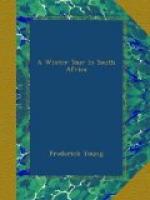of mineral wealth, Cape Colony is not so rich
as some adjacent lands. It contains coal,
but the individual beds of coal are thin, and owing
to this thinness the coal necessarily alternates
with shale, which is more conspicuous than in
the coal fields of Britain. I remember that Professor
Sedgwick, my old master in geology, told me that in
his youth seams of coal only some four to six
inches thick were worked on the sides of hills
in Yorkshire, and that the coal was carried on
horseback over the country to supply the wants of the
mountain population. Cape Colony is in a
far better state than that. In the Eastern
Province the beds of coal are frequently a foot or
two or more in thickness. They crop out
on the surface with a slight dip near to the
railway, and although only worked at present in a few
pits (as at Cyphergat, Fairview, Molteno—I
did not visit the Indwe)—the coal-bearing
rocks certainly extend over a much wider area
of country than that which has been explored.
One of the happy results at which I arrived in
my short visit to this district was to find that
there are certain extinct forms of reptilian life
associated with these coal beds, by means of which
the geological horizon upon which the coal occurs
may be traced through the country; so that there
is a prospect of this mineral being followed along
its outcrop in the Eastern Province with comparative
ease by this means. It is desirable on all
accounts that coal should be burned rather than
timber, since the destruction of wood is harmful to
the supply of water. With regard to the gold of
Cape Colony, I have not the requisite knowledge
to speak with the same confidence. The quantity
in any district is probably small: the amount
is great in the aggregate, but very widely diffused.
Gold appears to be present in small amounts in
almost all the volcanic rocks, so that as those
rocks decay and new mineral substances are formed out
of the decomposed products, the gold which they
contained is often preserved and concentrated
in thin and narrow veins of zeolitic minerals,
which extend over the surface of these volcanic rocks.
To what extent these zeolites may be hereafter
worked with profit it is impossible at present
to say, for much may depend upon water supply,
by means of which the ore would be crushed and washed,
and much on the varying quantities of gold present
in samples from different localities. On
the whole, the utilisation of science in the
service of man, especially in relation to metals, coal,
and water supply, if systematically carried out,
will, I believe, be an element of future prosperity
to Cape Colony, and enable the Colony to minister
to the welfare of adjacent lands.
Mr. J.X. MERRIMAN: I am sure South Africans are very grateful indeed to the amiable and kindly critic in the person of Sir Frederick Young. It is no new thing to Colonists to owe him a debt. All those present will acknowledge the great things he has done for the Colonies




